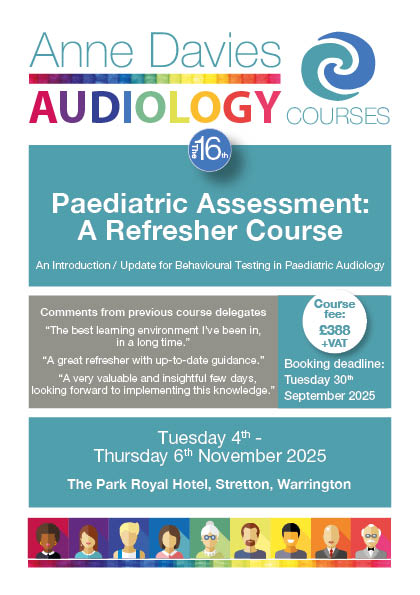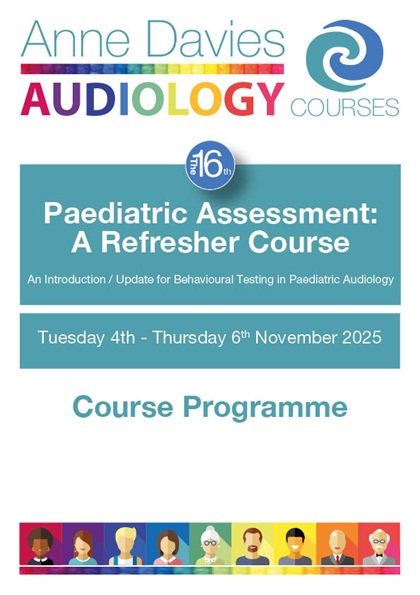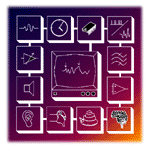Booking deadline: Tuesday 30 September 2025
The next course will be in November 2026; please contact us if you would like details when available.
£388.00
+ VAT
The Park Royal Hotel
Stretton Road
Stretton
Warrington
Cheshire
WA4 4NS
Non-residential course
Delegates are responsible for booking their own accommodation for this course. The Park Royal Hotel offers a discounted bed and breakfast rate for course attendees; please contact us for details.
This is an introductory course to Paediatric Assessment (Behavioural Testing). The course is for Audiologists who are beginning to work in Paediatric Testing or who would like an update on current test protocols. The course faculty are experienced clinical staff, and the course focuses on the skills needed for effective testing and clinical management.
The course programme covers all the main behavioural tests, including speech discrimination testing and VRA using insert earphones and bone conduction. It also includes history taking, planning, communication, management decisions and report writing. Appropriate national guidelines for Paediatric Testing are referenced throughout the course.
The course will be of interest to professionals who work with paediatric audiologists and who wish to gain an insight into Paediatric Assessment clinics. It is also appropriate as a short focused orientation for non-graduates (including associate and assistant practitioners) who may be assisting in paediatric clinics.
The course does not cover objective testing, advanced practice or assessment of complex cases.
 | Georgie Swainson Clinical Scientist |
 | Ed Brown Independent Audiology Consultant |
 | Dr Trevor Foster Clinical Lead (Paediatric Audiology) |
 | Louise Hart Audiologist |
 | Kathryn Woolley Head of Audiology (retired) |
 | Kathryn Lewis Head of Audiology |
 | Jonathan Proffitt Senior Calibration Engineer (Audiology) |
 | Dr Marc Spinoza Community Paediatrician |
| Tuesday 4th November 2025 | |
|---|---|
| from 8.30 | Arrival and Coffee |
| 9.00 | Welcome Anne Davies |
| 9.10 | Course Introduction Kath Lewis |
| 9.30 | Paediatric Development [1 hour] Dr Marc Spinoza |
| 10.35 | Break |
| 10.50 | History Taking [30 mins] Dr Trevor Foster |
| 11.25 | Calibration Essentials [1 hour] Jonathan Proffitt |
| 12.30 | Lunch |
| 1.30 | Children’s Safeguarding Issues [45 mins] Dr Marc Spinoza & Dr Trevor Foster |
| 2.20 | Report Writing and Record Keeping [30 mins] Kath Lewis |
| 2.55 | Visual Reinforcement Audiometry (VRA) Part 1 [45 mins] Ed Brown |
| 3.45 | Break |
| 4.00 | Visual Reinforcement Audiometry (VRA) Part 2 [45 mins] Ed Brown |
| 4.50 | Play Audiometry [30 mins] Kath Woolley |
| 5.20 | Questions and Discussion [10 mins] Course Faculty |
| 5.30 | End of Day |
| 6.00 | Evening meal, in the hotel restaurant |
| Wednesday 5th November 2025 | |
| 8.45 | Coffee |
| 9.00 | Introduction to ANSD and APD [1 hour] Georgie Swainson |
| 10.05 | Speech Discrimination Testing [1 hour] Dr Trevor Foster |
| 11.10 | Break |
| 11.25 | Non-Organic Hearing Loss [30 mins] Dr Trevor Foster |
| 12.00 | OAE, Tympanometry and Reflexes [45 mins] Louise Hart |
| 12.45 | Lunch |
| 1.45 | Planning the Session [1 hour 45 mins] Georgie Swainson |
| 3.30 | Break |
| 3.45 | Syndromes and Disorders [1 hour 15 mins] Dr Marc Spinoza |
| 5.05 | Distraction Testing [30 mins] Kath Woolley |
| 5.35 | End of Day |
| No evening meal provided, please make your own arrangements | |
| Thursday 6th November 2025 | |
| 8.45 | Coffee |
| 9.00 | Management Decisions [1 hour] Louise Hart |
| 10.05 | Communicating with Parents [1 hour] Louise Hart |
| 10.50 | Break |
| 11.05 | Introduction to Complex Cases [45 mins] Louise Hart |
| 11.55 | Case Presentations [30 mins] Louise Hart & Kath Lewis |
| 12.30 | Lunch |
| 1.30 | Workshop and Discussion [2 hours] Course Faculty and Manufacturers |
| 3.30 | Closing Plenary Session Anne Davies & Course Faculty |
| 4.00 | Close of Course |
Paediatric Development
A whistle-stop tour of stages in child development assessed by paediatricians as part of a paediatric history (including aspects of Down syndrome), which have implications for audiology testing.
History Taking
The essentials of a good history, why and when. Appropriate questions to ask. Example of history taking in clinic.
Calibration Essentials
The importance of calibration for paediatric audiology specifically.
Children’s Safeguarding Issues
Raising awareness of child protection issues in relation to audiology.
Report Writing and Record Keeping
Essence and structure of a good report. Why we write them, who to, and what should they inform the recipient about.
Visual Reinforcement Audiometry (VRA) Part 1
Underlying principles of Visual Reinforcement Audiometry (VRA), room set-up, equipment. The practical procedure of performing VRA in the soundfield.
Visual Reinforcement Audiometry (VRA) Part 2
The challenges whilst performing VRA; tactics and good practice to obtain reliable results. The use of insert earphones and bone conduction transducers. Interpretation of VRA results.
Play Audiometry
The requirements of the test, environment, and equipment. The suitability of play audiometry and the techniques, procedure and results. This is supported by a video demonstration.
Introduction to ANSD and APD
A basic introduction to these conditions, diagnosis and management, case studies.
Speech Discrimination Testing
The various types of speech tests available. Appropriate tests for developmental age. Examples of live test in a clinic.
Non-Organic Hearing Loss
A brief overview of assessment options and test strategy, when managing children who present with non-organic hearing loss.
OAE, Tympanometry and Reflexes
Test protocols, parameters and pitfalls. The difference between standard and high frequency tympanometry testing and results.
Planning the Session
Why and when do we plan, using information from the referral and history, deciding which tests to use, interactive group work.
Syndromes and Disorders
A review of causes of deafness including syndromes, infections, and other disorders affecting hearing.
Distraction Testing
Although this test is not now used routinely (and rightly so), the principles of the orienting reflex remain helpful for difficult to test children when VRA is not possible. Criteria for testing, equipment required, frequencies produced, room set-up and pitfalls.
Management Decisions
Factors to be considered when formulating management plans. Discussion of case histories and management options.
Communicating with Parents
Communications skills, scenarios and group work on explaining different results.
Introduction to Complex Cases
Tips and tactics to get the most out of an assessment when testing is more complex or challenging than expected.
Case Presentations
Examples of when to change how we assess and adapt when faced with more challenging cases in clinic.
Workshop and Discussion
Hands-on work in small groups.
“The best learning environment I’ve been in, in a long time.”
“A great refresher with up-to-date guidance.”
“A very valuable and insightful few days, looking forward to implementing this knowledge.”
This is a non-residential course; delegates are responsible for booking their own accommodation. Accommodation costs are not included in the course fee.
The course venue is The Park Royal Hotel, Stretton Road, Stretton, Warrington WA4 4NS. This is on the outskirts of Warrington, a 15-20 min taxi ride from Warrington town centre. The Park Royal Hotel offers a discounted bed and breakfast rate for course attendees; please contact us for details.
The course fee includes evening meal on the Tuesday evening of the course at 6.00pm. On Wednesday evening, please make your own arrangements for evening meal.
Driving into and out of Warrington can be subject to considerable delay during rush-hour. We therefore recommend staying over, rather than driving daily to the course. Where the latter is unavoidable, please leave plenty of time for your journey.
Leaving the course early on the final afternoon is not advised. Train travel from the Warrington stations should be booked for no earlier than 4.45pm.
Purchase order number and invoice address (supplier: Anne Davies Audiology Courses).
Cheque (payable to Anne Davies Audiology Courses).
Credit / debit card. Pay online at time of booking.
Monthly instalments by direct debit (UK customers). Two payments of 50% over two months, or three payments of 33.3% over three months, interest free.
If you are travelling from overseas and require a visa: once you register and pay, we can provide a letter confirming your place on the course. Please contact us to discuss.




